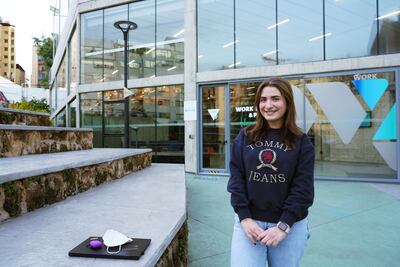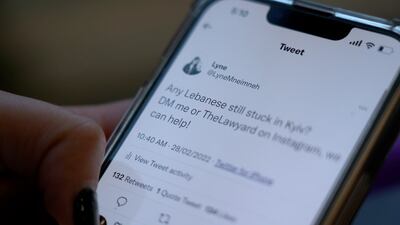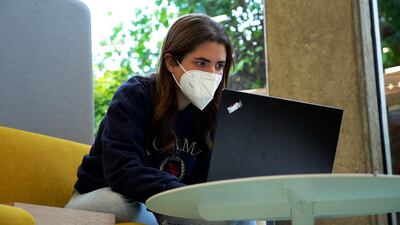Live updates: follow the latest news on Russia-Ukraine
As more than two million people flee war-torn Ukraine, a social media news page has sprung up to support Lebanese refugees attempting to escape the conflict.
Medical student Abdullah Shami was one of the thousands of Lebanese people initially trapped in Ukraine.
He said the journey to escape the country marked one of the worst days of his life — but he found help on the other side of the border in the shape of a support network for refugees.
Two young Lebanese women who run Instagram news page The Lawyard have been working to connect Lebanese refugees with NGOs and volunteers, to help them find resources such as transport or a place to sleep.
Mr Shami said help from The Lawyard has been vital for Lebanese citizens fleeing Ukraine after the Russian invasion.
“If there was someone without a place to stay, they would find them a place to stay. If they had no money, they would provide them with money,” he told The National from temporary accommodation in Paris.
Lyne Mneimneh, 22, co-founder of The Lawyard, told The National that "we had to do something, we had to help these people”.
“Some people in Lebanon lost contact with their family members," she said.
“We started contacting people from Poland and asking people to talk to us if they knew somebody there. This is how we started creating some kind of network of people in neighbouring countries to Ukraine and people inside Ukraine who can help us evacuate these Lebanese people that are stuck there.”
Ms Mneimneh and her childhood friend Zeinab Halabi, also 22, set up The Lawyard in 2018. It has now grown to about 40,000 Instagram followers.
They have also been helping refugees to apply for emergency study visas, to help them leave Ukraine.

Ms Halabi, who is studying for a master's degree in law, said: “We first found out that the Lebanese students were stuck because one of them posted on social media a video calling for the Lebanese government to evacuate them.
“[The embassy] set up a hotline for Lebanese students to reach them, but it was not being answered. So the students started tweeting or posting details on social media. They said they drove towards Poland and were at the border, but could not cross because they needed letters from the Lebanese embassy.
“And then the officials let them in. But the students found out that they did not have a place to stay, and it was cold. So they started calling on Lebanese people in Poland to help them and take them in."
Ms Mneimneh, who works for a company that specialises in public sector reform, said efforts made through The Layward had helped some students by Saturday evening.
"They were able to get shelter, they were able to get blankets, food, even a phone card with internet connection," she said.
“So they are currently being taken care of. But this is not permanent. This is only for just a few days, maybe later on, they will have to rely on themselves. Yet we do not have a clear plan from the government.”

'Some embassies sent buses ... Lebanon didn't send anything'
The Lebanese embassy in Ukraine has come under fire for not providing sufficient assistance to its citizens fleeing the conflict. No logistics were arranged for getting to the border and there was the insufficiently staffed information hotline.
Mr Shami said: “Some embassies were sending buses [while] Lebanon didn't send anything.”
Ambassador to Ukraine Ali Daher told media in Lebanon: "Sometimes I cannot reply to everyone and I should not be blamed for not answering. And I repeat, calling a hotline number does not mean getting an immediate response. A hotline means giving the appropriate solution after receiving it."
Ms Mneimneh and Ms Halabi, who met at school in the ninth year, had previously helped to connect and co-ordinate volunteers who wanted to assist after the Beirut port blast.
“When the explosion happened we started the next morning, on August 5, guiding people,” said Ms Mneimneh.

Through their page, they shared the requests of NGOs that needed volunteers in certain areas to help with clean-up operations or distribution of food and medicine.
Ms Mneimneh said they also raised money through the page for renovations and to help buy food and medicine.
She said she picked up crisis management techniques that she could use to help people struggling after Russia’s invasion of Ukraine.
“We learnt to deal with literally one of the most difficult situations that we might ever face as Lebanese citizens,” she said.
“So Zeinab and I were able to pick up how to actually make connections in times of crisis that can benefit people around those that come and ask for help.
“What do we do? We cover the news. So we can attract experts, we can attract donors, we can attract people who can help, and I can take care of the PR. So it's always teamwork.
“We learnt how to function as a team in times of crisis because we're in constant type of crisis in Lebanon. So it's a lesson for us.
“Staying calm makes you think about ways to work, not harder, actually smarter.”
A lack of logistical support is not the only barrier Lebanese refugees have faced, Ms Mneimneh said.
“Language is a huge barrier," she said. "Students told us that if they hadn't spoken Ukrainian, they [border control] wouldn't have helped them because they’re Arabs. It's sad.
"A while ago [in 2021] at the Polish border, they left Syrians and Palestinians in the cold. They used water to disperse them and temperatures were so low.
“So I wouldn't really be surprised if that is happening again, with Arabs and Africans and minorities, you know, they're not white people.
She said some media outlets appeared to be showing racial bias.
"They were comparing civilised refugees to uncivilised refugees, which is actually so bad and it shows what's actually really wrong in the world.”
